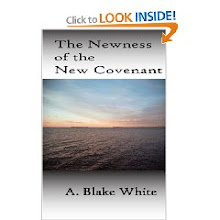 This post is a continuation of our summary look at New Covenant Theology that we began yesterday.
This post is a continuation of our summary look at New Covenant Theology that we began yesterday. NCT’S PRINCIPLE OF PROGRESSION
NCT is different than the other two systems because it affirms rather robustly that Scripture, by nature, is progressive in its revelatory message. In other words, God has chosen, in His supreme wisdom, to reveal His plan of redemption through a revelatory process that does not give all the facts in one event. Instead, He has chosen to reveal fragments of truth at certain moments of history pertaining to His overall goal of redeeming an elect people for His glory.
NCT is different than the other two systems because it affirms rather robustly that Scripture, by nature, is progressive in its revelatory message. In other words, God has chosen, in His supreme wisdom, to reveal His plan of redemption through a revelatory process that does not give all the facts in one event. Instead, He has chosen to reveal fragments of truth at certain moments of history pertaining to His overall goal of redeeming an elect people for His glory.
There seems to be two major categories where the progression of God’s revelation can be seen. First, the Gospel itself is revealed in a progressive manner. Beginning in Genesis 3, and moving through redemptive history to the incarnation, crucifixion, resurrection, ascension, and the writings of the Apostles we find that the Gospel becomes clearer and clearer. Think of the confusion that the Apostles had during and even following Christ’s crucifixion. Think of all the Jewish/Gentile issues that the Apostle Paul wrote about. Think of the message of James (the half brother of our Lord) who wrote to clarify that the Gospel did not promote an idea of “cheap grace”- that faith without works is dead. Think about the complementary message of the Apostle John who said that love should reign supreme in the life of the one trusting and resting in Christ. In addition, we also should not forget the book of Acts, and all the issues (Jew/Gentile) that confronted the Jerusalem Council. Remember Peter who was even confused on the relationship between Jew and Gentile. Paul speaks about his confrontation with Peter over this very issue in the book of Galatians. The point is simply that the Gospel becomes clearer the further one moves in redemptive history. As one views the timeline of the Bible he sees that God's plan of redemption was not understood equally by God's people in all ages. The Apostles understood much more than the prophets. The believer's who made up the first century church under the Apostle Paul's ministry understood far more than the Patriarchs. We understand far more than Adam and Eve. NCT seems to recognize this more robustly than the other two systems.
Second, God’s absolute law is revealed in a progressive manner. The law God gave to Adam in the Garden of Eden consisted of being fruitful and multiplying, and not eating of the tree of the knowledge of good and evil. When we fast forward past Abraham to the time of Israel’s deliverance from Egyptian bondage we find God’s law codified (written down) for the first time. On Mt. Sinai God writes with His own finger on tablets of stone a more extended version of His law. It was certainly more expansive than the law that Adam received in the Garden. But when Christ came, He represented the fullest embodiment of God’s absolute law. He revealed God’s law through the demonstration of His own character and through His preaching (namely the Sermon on the Mount).
Allow me to provide a caveat to the above statements. The other two systems (DT and CT) might at times affirm a progressive revelation of Scripture. However, on a whole both systems fail to allow the progressive revelation of God’s word to effect every aspect of their systems. CT tends to downplay the progressive nature of God’s revelation by emphasizing one covenant of grace. Thus, they effectively "flatten" Scripture. DT tends to overlook the harmony of progressive revelation because they are so focused on God’s promises to ethnic Israel, and the fulfilling of those promises in the future. Thus, they effectively "breakup" the unity of Scripture. NCT neither flattens, or breaks up Scripture. Instead, it offers a unified goal of redemption seen in progressive stages.
NCT’S PRINCIPLE OF APPLICATION
As mentioned above, NCT clearly has a different position on “law” than the other two systems. It affirms a progressive revelation of God’s law. This fifth principle of NCT essentially argues that God’s law is applied differently to His people according to different points in redemptive history.
NCT’S PRINCIPLE OF APPLICATION
As mentioned above, NCT clearly has a different position on “law” than the other two systems. It affirms a progressive revelation of God’s law. This fifth principle of NCT essentially argues that God’s law is applied differently to His people according to different points in redemptive history.
For example, the Mosaic law (the law established by God that Moses mediated) was given to the nation of Israel upon their deliverance form Egyptian bondage. Surely this law was a revelation of God’s character. Indeed, it was binding. Furthermore, it was in no way arbitrary. Its purpose however was meant to bind and accuse the conscience of those in the nation of Israel. It was meant to condemn the sinner by showing him that he can never obey the commands of God perfectly. It was meant to be a mirror in which one could look and say, “Wow, I am ugly! I have failed again. I can’t be like God, for I am just a sinful creature. I am not living the way I was created to live.” The standards of the law were simply meant to reflect back to the sinner his sinful, unacceptable identity. It was meant to reflect back to the sinner the way in which God viewed him. That was God’s divine purpose for the Mosaic law (Galatians 3:15-22; Hebrews 8:6-7). The mantra of the Mosaic covenant was “Keep the law and you will live”.
NCT simply does not view the Mosaic law as the unchanging, eternal, moral law of God. In other words, it is argued that God did not give His the law at Mt. Sinai in order to fully reveal Himself. Rather, He gave it to show man the exceeding sinfulness of man- to reveal his depravity. However, NCT does not deny, rather it affirms, that the Mosaic law contains elements of God’s absolute law. A distinction can be made between what is called “absolute” law and “covenantal” law. Absolute law refers to the law written on the heart of every human being (Romans 1) who is created in the image of God. Covenantal law refers to a particular revelation of God’s law that cannot change according to a particular covenant. In order for new law to come, a new covenant must come. The law and the covenant are bound up together.
Let me make myself very clear. NCT does not deny in any way whatsoever that there has been, is, and always will be an eternal standard of righteousness (laws for true believers to follow). But if we hold that God is sovereign, then we must simply recognize His right to reveal His law to man as He chooses and wishes. NCT simply argues that He chose to do this progressively, rather than in one shot at Mt. Sinai. From this NCT concludes that if the main function of Mosaic law was to reveal sin, then when the new covenant was established a fuller revelation of God's law was given and the citizens of the new covenant are no longer bound to Mosaic law.
So if believers today are not bound to Mosaic law, are they bound to law? Absolutely! However, it is not Mosaic law, nor do believers relate to this law the same as the nation of Israel did to their law (the ten commandments). The law of Christ, contained primarily in the New Testament Scriptures, is now in force for the church. But while the law of Christ reveals the standard of obedience for the new covenant believer, the new covenant believer is not related to this law in the same way that an old covenant believer (the nation of Israel) related to the law of Moses. The main reason for this is due to the indwelling of the Holy Spirit (more on this in later posts). The believer in the new covenant, in contrast to someone in the old covenant, has a desire to obey God and the ability to do so because of the Holy Spirit (Romans 8:1-16; Galatians 5:16-24; Hebrews 8:10, cf. Jeremiah 31:33). In addition, the law of Christ is not composed of legally binding and conditional stipulations.
Let me offer to you a comment by Fred Zaspel pertaining to the law that I will probably quote again at some point because it is so good:
“The law of God is always binding and could never be anything else. Before Moses there was no formal codification of it. Since Moses there have been differing codifications of it in accordance with covenantal relationships. The Old and New Covenants entail varying responsibilities, some of which are identical to each other (because of a common basis) and some exclusive of each other (because of fulfillment and further revelation). But the standard of conduct for today’s believers is found in the framework of New Covenant teaching, not that of the Old Covenant. To this rule of life He is bound as to law, and this law, like that of Moses, is sufficient to bring men ‘to an acknowledgement of their sins’”.
My only point under this fifth principle is simply that NCT sees the application of the law in the life of the believer as different depending upon the point in redemptive history.
Lord willing I will give the sixth principle on tomorrow’s post. I do not want to move too quickly. There is much in what I have said in this post to think about. The goal of these posts is not simply to disseminate information for "information's sake". Rather, the goal is to provide some thoughts on how Scripture fits together, so one can come to conclusions pertaining to this important topic that are based upon Scripture after careful, thoughtful, and sincere study. Everyone must be convinced in his own mind. But remember that God’s word is to richly dwell within us (Colossians 3:16). Our thinking must be saturated with Scripture!
Thankful for the New Covenant,
Pastor Andy








Thanks, these are helpful to understand NCT
ReplyDelete